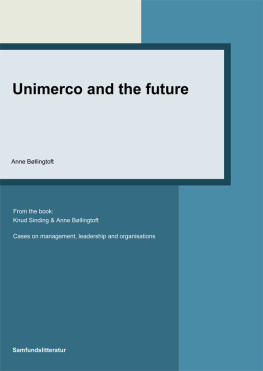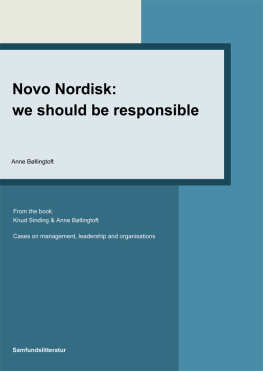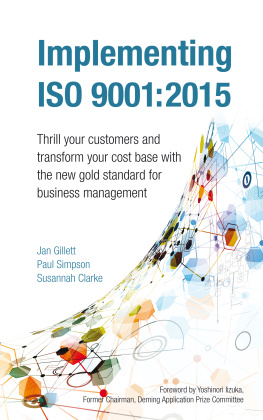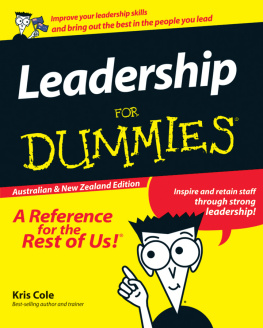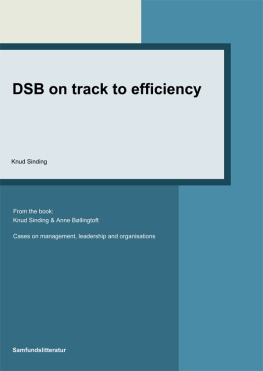Bøllingtoft - Unimerco and the future Cases on Management, Leadership and Organisations
Here you can read online Bøllingtoft - Unimerco and the future Cases on Management, Leadership and Organisations full text of the book (entire story) in english for free. Download pdf and epub, get meaning, cover and reviews about this ebook. City: Samfundslitteratur, year: 2013, publisher: Samfundlitteratur;Anne Bøllingtoft, Samfundslitteratur, genre: Politics. Description of the work, (preface) as well as reviews are available. Best literature library LitArk.com created for fans of good reading and offers a wide selection of genres:
Romance novel
Science fiction
Adventure
Detective
Science
History
Home and family
Prose
Art
Politics
Computer
Non-fiction
Religion
Business
Children
Humor
Choose a favorite category and find really read worthwhile books. Enjoy immersion in the world of imagination, feel the emotions of the characters or learn something new for yourself, make an fascinating discovery.
- Book:Unimerco and the future Cases on Management, Leadership and Organisations
- Author:
- Publisher:Samfundlitteratur;Anne Bøllingtoft, Samfundslitteratur
- Genre:
- Year:2013
- City:Samfundslitteratur
- Rating:4 / 5
- Favourites:Add to favourites
- Your mark:
- 80
- 1
- 2
- 3
- 4
- 5
Unimerco and the future Cases on Management, Leadership and Organisations: summary, description and annotation
We offer to read an annotation, description, summary or preface (depends on what the author of the book "Unimerco and the future Cases on Management, Leadership and Organisations" wrote himself). If you haven't found the necessary information about the book — write in the comments, we will try to find it.
Bøllingtoft: author's other books
Who wrote Unimerco and the future Cases on Management, Leadership and Organisations? Find out the surname, the name of the author of the book and a list of all author's works by series.
Unimerco and the future Cases on Management, Leadership and Organisations — read online for free the complete book (whole text) full work
Below is the text of the book, divided by pages. System saving the place of the last page read, allows you to conveniently read the book "Unimerco and the future Cases on Management, Leadership and Organisations" online for free, without having to search again every time where you left off. Put a bookmark, and you can go to the page where you finished reading at any time.
Font size:
Interval:
Bookmark:
Anne Bllingtoft
Unimerco and the future

Anne Bllingtoft
Unimerco and the future
From the book:
Knud Sinding and Anne Bllingtoft
Cases on Management, Leadership and Organisations, 1st edition 2012, chapter 13
1st e-book chapter 2013
Samfundslitteratur 2012
Cover design: Klahr|Graphic Design
Typeset: SL grafik, Frederiksberg
E-book production: Rosendahls BookPartnerMedia
ISBN: 978-87-593-9531-8
Samfundslitteratur
Rosenoerns All 9
DK-1970 Frederiksberg C
Denmark
Tlf: + 45 38 15 38 80
Fax: + 45 35 35 78 22
www.samfundslitteratur.dk
All rights reserved.
No part of this publication may be reproduced or used in any form or by any means graphic, electronic or mechanical including photocopying, recording, taping or information storage or retrieval system without permission in writing from the publisher.
CHAPTER 13
UNIMERCO AND THE FUTURE
At Unimerco, some of their success has been attributed to the companys ownership model, in which employees and management jointly own the company. Yet if this is the recipe for success, then why dont all companies use a similar model? And what will happen after the Kycera Groups takeover?
Despite the fact that Unimerco is among the very best in their industry, it isnt the only reason why, each year, between 5,000 and 10,000 visitors make their way to either the headquarters outside of Herning, Denmark or to one of the groups other offices in, for instance, the USA or England. The many guests dont come to study products, but to see a workplace where non-traditional approaches have led to success.
Unimerco was founded in 1964 and is the producer and distributor of grinding solutions for machining tools and service to customers in the automotive and aerospace industries. The customers include, Boeing, General Motors, Ford and Hyundai. Unimerco manufactures complicated products that arent sold based on price, but because they can solve tasks which other tools cant handle. Compared to other tool companies, Unimerco has a consultancy portion, which makes them unique. As Kenneth Iversen, CEO, describes it, Unimerco resembles an IT company consisting of a software part and a hardware part. Unimercos hardware is the tools and the software is the consultations explaining how to correctly use the tools in production.
When Kenneth Iversen was hired as CFO in 1976, he was employee number 38. Today, the company has approximately 650 employees, and Kenneth Iversen is CEO. What they all have in common is that they work in a corporation without walls. Unimercos buildings are designed as sheltered villages without physical separation of the companys operations. In this way, production, storage and administration are, in other words, gathered in one large room, and engineers, construction workers, salesmen, industrial technicians and machine operators, who control advanced machines, work side by side. Special noise reducing solutions make it possible to have a conversation right next to the big machines.
The inspiration comes from villages where everyone knows each other and each persons respective role in the big picture. According to Unimerco, the result is a strong team where unhindered communication and short decision pathways create a unique, innovative environment with a large degree of knowledge sharing across all of the companys functions and subjects. Additionally, the people at Unimerco believe that the buildings, management style and reward structure, together with the informal atmosphere in their flat organisation, establishes a pleasant and motivating framework for the workday.
Good communication is a basic element in Unimercos corporate culture, and their unique design, the sheltered village, allows communication to flow freely and unhindered.
Walls establish cliques. People dont talk together enough and there isnt the amount of communication and innovation there should be in a company. Furthermore, walls cause many errors. If colleagues are in contact with one another and talk with one another more, the frequency of errors decreases, and it becomes much more exciting to be in the company. In addition, rumours dont arise, as rumours cant be started about things, which everybody can see.
This is what Kenneth Iversen, whose own desk is placed among his colleagues in the middle of the room, notes.
Shareholding scheme and profit sharing
When Iversen was hired in 1976, the founder had decided that Unimerco should be reserved for the people who took part in creating the company. He got his children to give up their inheritance rights and created a fund reserved for taking over the company. However, Iversen wanted to take it a step further:
But that wouldnt make it the employees company. So, I said to him that we had to do it another way. There is a model in the fishing industry, where I come from. On a fishing boat, there are typically three to four men. There, the catch is shared so the ship gets half and the crew gets the other half. We did the same here and shared out the profits each month.
Afterwards, ownership has been distributed to most of the employees through shares. The non-managing staff own about 54 percent, management and key employees 30 percent, and Iversen owns 25 percent of the shares. Iversen explains:
Who goes home last? The person who has funds and earnings at stake. In return, we all share the rewards when things go well.
A consequence of the ownership model is that everyone are informed as their ownership merits. As a basis for dialogue and insight, informing about decisions, new initiatives and changes at an early stage is only natural. However, direct information entails obligations, and when all employees are presentd with the same information as top management and the board, it of course requires confidentiality in handling the information; something, which is taken for granted at Unimerco. Internal communication at Unimerco includes:
Daily sales
Monthly information about accounting, strategy explanations and highlights
Caf meetings which allow for questions and dialogue.
Each month, the profits are shared and paid out as a supplement to salaries. The basic principle is that both creating and sharing is common. All must have a joint responsibility in serving the customer well, and it must be evident in both earnings and generation of wealth, both when it goes well and when it goes less well. Iversen elaborates:
It [our ownership model] is very important when it comes to understanding that if we dont serve the customer well, that customer wont come back next time. The individual employee knows that if they dont do their jobs well enough, it isnt just his/her own earnings, but also his/her own wealth that will come under pressure. Working for yourself and not just for a company also ensures greater job satisfaction.
Everyone at Unimerco are employed as salaried employees or functionaries. Approximately half of them are tool technicians (machinists, tool makers, etc.), who are engaged directly in production. The rest are engaged in tool construction, IT, storage, kitchen, property, sales, administration and management. For more than 25 years the people at Unimerco have been paid the same wages for the same work functions. Pay raises are a percentage increase, which is generally the same for employees on the same level.
Responsibility to those that have the competency
Unimerco works to secure dynamism and agreement within the entire organisation by keeping a flat structure where decisions and responsibility, to the fullest possible extent, are delegated to the employees with the relevant skills. In practice, this means that Unimerco makes extensive use of autonomous groups and interorganisational cooperation at all levels.
Next pageFont size:
Interval:
Bookmark:
Similar books «Unimerco and the future Cases on Management, Leadership and Organisations»
Look at similar books to Unimerco and the future Cases on Management, Leadership and Organisations. We have selected literature similar in name and meaning in the hope of providing readers with more options to find new, interesting, not yet read works.
Discussion, reviews of the book Unimerco and the future Cases on Management, Leadership and Organisations and just readers' own opinions. Leave your comments, write what you think about the work, its meaning or the main characters. Specify what exactly you liked and what you didn't like, and why you think so.

